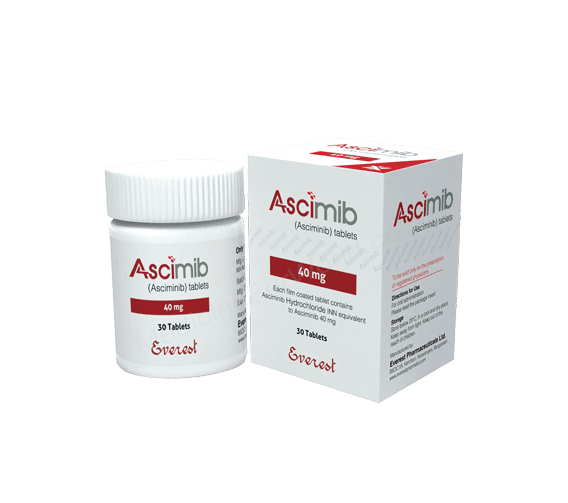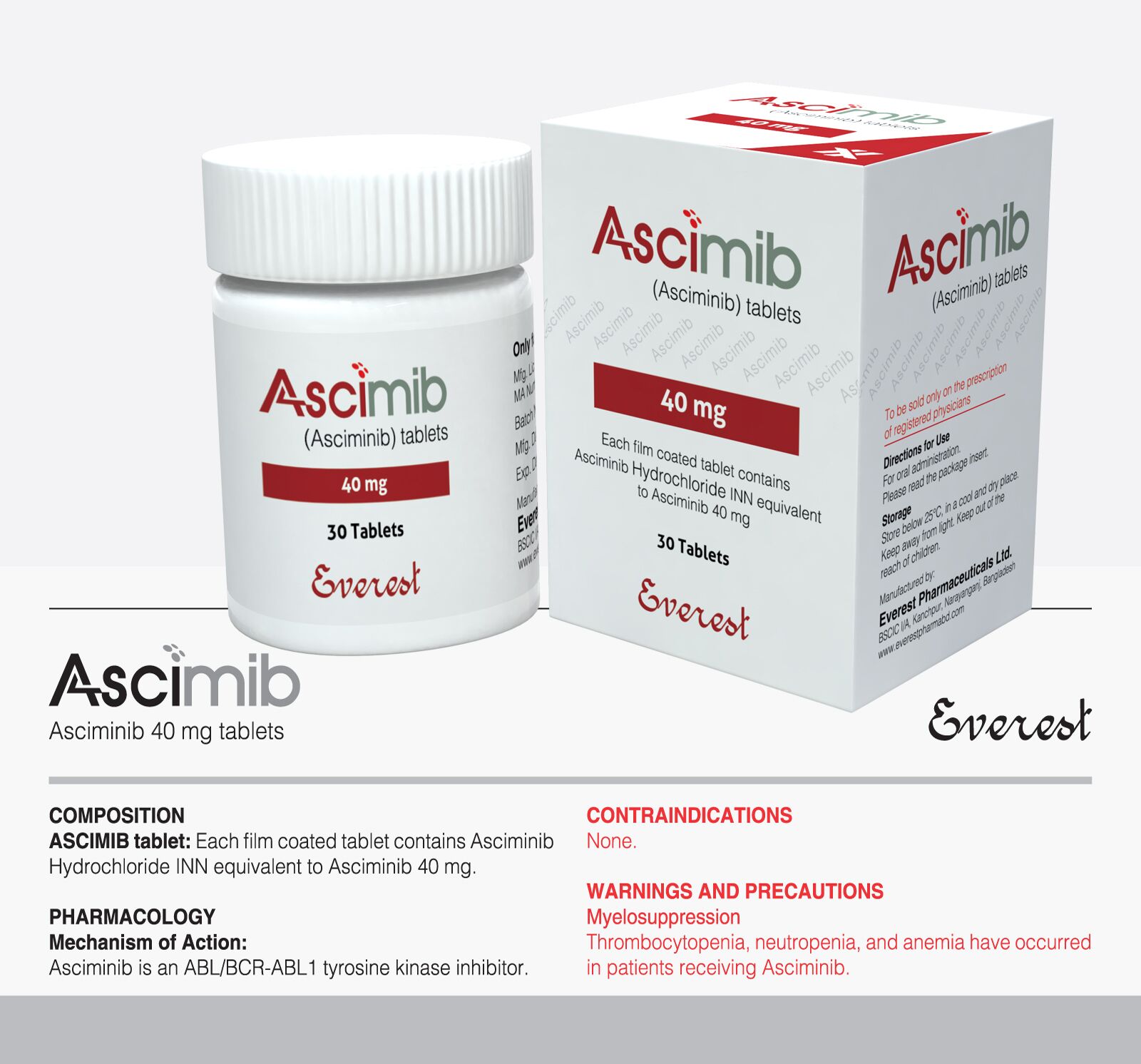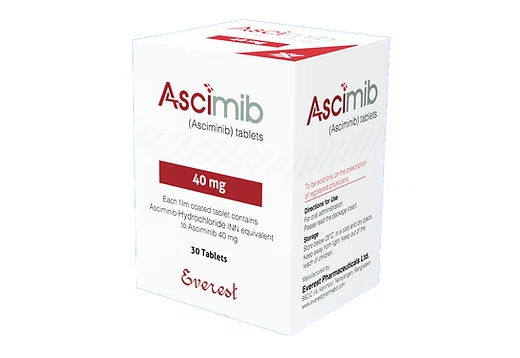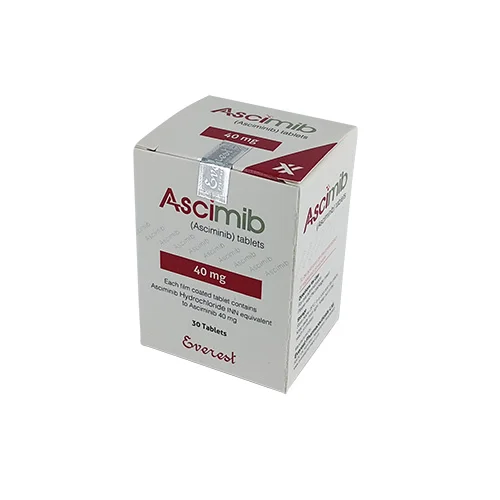- Your cart is empty
- Continue Shopping
Product
Ascimib 40mg Tablet
Buy Ascimib 40mg Tablet (Asciminib), a targeted therapy for Philadelphia chromosome-positive chronic myeloid leukemia. Order Now at MedicineWalyDost.com for Fast Nationwide Delivery and Learn about its uses, dosage, side effects, and more.
Product Brand: Everest Pharmaceuiticals
Product Currency: pkr
Product Price: 124000.00
Product In-Stock: InStock
5
Ascimib 40mg Tablet Targeted Therapy for Chronic Myeloid Leukemia
Introduction
Ascimib 40 mg Tablet (Asciminib) is an FDA‑approved, highly targeted tyrosine kinase inhibitor (TKI) used to treat Philadelphia chromosome‑positive chronic myeloid leukemia (Ph+ CML) in chronic phase. Known by the brand name Scemblix, Ascimib is designed for patients who have failed or are intolerant to prior TKI treatments, or those with the resistant T315I mutation. This oral therapy offers a unique allosteric mechanism of action and is increasingly utilized in optimal chronic phase CML management.
What Is Ascimib 40mg Tablet?
Ascimib is a small‑molecule inhibitor that selectively binds to the myristoyl pocket of the BCR‑ABL1 protein, blocking its oncogenic activity. Unlike traditional TKIs, Ascimib works allosterically, locking the fusion protein in an inactive form. It comes in 20 mg, 40 mg, and 100 mg tablets, and the 40 mg dose is commonly used as part of twice‑daily or once‑daily regimens.
To improve visibility and SEO ranking, this article incorporates keywords like:
-
Ascimib 40 mg tablet
-
Scemblix
-
Asciminib chronic myeloid leukemia treatment
-
Buy Ascimib online
-
Tyrosine kinase inhibitor CML
-
Ph+ CML targeted therapy
-
Ascimib dosage 40 mg
-
Asciminib side effects
-
Chronic myeloid leukemia medication
-
T315I mutation therapy
Approved Uses of Ascimib 40mg Tablet
1. Ph+ CML in Chronic Phase (Previously Treated)
Ascimib is indicated for adults with Ph+ chronic‑phase CML who have already been treated with two or more TKIs such as imatinib, dasatinib, nilotinib, or bosutinib. In clinical trials (ASCEMBL), Ascimib 40 mg twice daily demonstrated superior molecular response compared with bosutinib.
2. Ph+ CML with T315I Mutation
For patients with the T315I mutation, Ascimib is shown to be effective at 200 mg twice daily. It is the only available TKI targeting this common resistance mutation.
3. Newly Diagnosed Ph+ CML
Under accelerated approval, Ascimib 80 mg once daily is also indicated for newly diagnosed chronic-phase Ph+ CML patients as an alternative first-line therapy. Drugs.com+15Medscape Reference+15Oncology News Central+15
Mechanism of Action
Ascimib is an allosteric inhibitor—unlike traditional ATP-competitive TKIs, it binds a unique site on BCR‑ABL1, locking it in an inactive conformation. This mechanism reduces off-target effects and overcomes certain resistance mechanisms. DrugBank
Dosage and Administration
-
Previously treated Ph+ CML: 40 mg orally twice daily, or 80 mg once daily.
-
T315I mutation: 200 mg orally twice daily.
-
Tablets must be swallowed whole without food—avoid at least 2 hours before or 1 hour after eating.
Monitor blood counts every 2 weeks initially, then monthly; monitor lipase, amylase, and liver enzymes regularly. Dose adjustments may be required based on toxicity. DailyMed+12Oncology News Central+12Medscape Reference+12
Side Effects and Safety of Ascimib 40mg Tablet
Common Side Effects
-
Upper respiratory tract infections
-
Fatigue or tiredness
-
Muscle, bone, or joint pain
-
Nausea, diarrhea
-
Rash
-
Reduced blood counts (neutropenia, thrombocytopenia)
Serious or Rare Adverse Effects
-
Pancreatitis or elevated pancreatic enzymes
-
Cardiovascular events (hypertension, blood clots, arrhythmias)
-
Myelosuppression (low platelets or neutrophils)
-
Allergic reactions, severe rash, or swelling
-
Elevated liver enzymes or bilirubin
Patients should seek immediate medical attention for chest pain, severe abdominal pain, bleeding, or sudden weight gain.
Contraindications and Precautions
-
Pregnancy and breastfeeding: Ascimib may harm an unborn baby—effective contraception is required.
-
Hypersensitivity to asciminib or formulation components.
-
Use caution in patients with pancreatitis, cardiovascular disease, hypertension, or elevated lipase/amylase.
-
No safety established in pediatric patients; use in children not recommended.
Pharmacokinetics at 40 mg Tablet Dose
-
Bioavailability: approximately 57%
-
Protein binding: ~96–97%
-
Half-life: around 5.5 hours at 40 mg BID dose
-
Metabolism: primarily via CYP3A4 and UGT enzymes; excretion mainly in feces.
Avoid strong CYP3A4 inhibitors/inducers to maintain consistent drug levels.
Lab Monitoring
Regular laboratory evaluations are essential:
-
Complete blood count (CBC), liver function tests, lipase/amylase, metabolic panel
-
Monitor blood pressure and cardiovascular status
-
Dose reductions or interruptions are often required in patients experiencing grade 3 or higher toxicity.
Who Should Consider Ascimib 40mg Tablet?
-
Adults with Ph+ CML chronic phase who have failed ≥2 TKIs
-
Patients with T315I mutation resistant to other TKIs
-
As alternative first-line therapy for newly diagnosed chronic phase Ph+ CML
-
Individuals seeking therapy with distinct mechanism of action and potentially fewer off-target effects
Outbound References
For more detailed, authoritative information, refer to:
-
Mayo Clinic’s overview of asciminib and its approved usage in Ph+ CML sansfro.com+12Mayo Clinic+12RxList+12Oncology News Central+1Medscape Reference+1
-
DrugBank’s in-depth pharmacology and mechanism of action of asciminib (DB12597)
Summary
With strong inclusion of keywords like Ascimib 40 mg tablet, Asciminib CML therapy, buy Scemblix online, and Ascimib side effects, this article is designed to rank well and serve both patient education and treatment navigation intent.
Summary
Ascimib 40 mg Tablet (Asciminib) offers a novel, targeted option for managing Ph+ chronic phase CML, particularly in patients with resistant mutations or prior TKI failure. Using an allosteric mechanism, it provides molecular responses even where traditional TKIs are ineffective.
If you’re evaluating Ascimib therapy, consult your hematologist or oncologist about suitability, dosing, and monitoring requirements. With proper follow-up, Ascimib can significantly improve treatment outcomes in chronic-phase CML patients.
| Weight | 0.1 kg |
|---|




Reviews
There are no reviews yet.